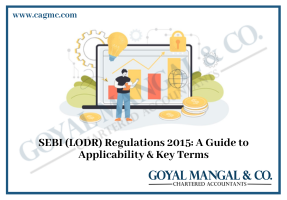
As of February 2023, there are various legal obligations in India that individuals and businesses must be aware of to avoid potential legal consequences. In this article, we will discuss some of the important Legal Obligations & updates in India for February 2023.
February 2023 Legal Obligations
Many forms and challans are needed to be filled throughout the year. Some of them need to be filled monthly and these were some of legal obligations. This article explains about all the obligations that are needed to be discharged be it form or challan to be filled or filed, period by which obligation needs to be discharged, frequency of the obligation and kinds of obligations that are need to be fulfilled.
February 2023 Legal Obligations: Goods and Service Tax, 2017
The GST to be rolled out will be a dual GST in which the Centre and States will simultaneously levy on a common tax base. The Centre would levy GST on the intra-state supply of goods and/or services and it would be named Central GST (“CGST”). The Centre would also levy and administer an integrated GST (“IGST”) on every interstate supply of goods and services. Such tax shall be apportioned between the Union and the States in the manner as may be provided by Parliament by law on the recommendations of the Goods and Services Tax Council.
The GST to be levied by the States would be called State GST (“SGST”). One may wonder about the necessity of a dual GST and the answer lies in the fact that India is a federal state and both Central and State Governments need to respectively exercise powers and discharge their respective responsibilities enshrined in the constitution as per division of powers.
| DATE | FORM | PERIOD | FREQUENCY | LEGAL OBLIGATION |
| 10th Feb | GSTR-7 | JAN 2023 | MONTHLY | Filing of return by tax deductor |
| 10th Feb | GSTR-8 | JAN 2023 | MONTHLY | Filing of return by E-commerce operator |
| 11th Feb | GSTR-1 | JAN 2023 | MONTHLY | Filing of return where annual turnover is exceeding INR 5 crore. |
| 13TH Feb | IFF | JAN 2023 | MONTHLY | (a) Uploading of invoice under QRMP scheme is not required for June, Sep, Dec and March Month or
(b) Uploading of invoice under QRMP scheme is required for April, May, July, August, Oct, Nov, Jan and Feb Month. |
| 13th Feb | GSTR-6 | JAN 2023 | MONTHLY | Filing of return by Input Service Distributor (ISD). |
| 13th Feb | GSTR-5 | JAN 2023 | MONTHLY | Filing of return by Non–resident dealer. |
| 20th Feb | GSTR-5A | JAN 2023 | MONTHLY | Filing of return by OIDAR service provider |
| 20th Feb | GSTR 3B | JAN 2023 | MONTHLY | Deposit for GST where annual turnover is exceeding INR 5 crore |
| 22nd Feb | GSTR 3B | JAN 2023 | MONTHLY | Deposit for GST where annual turnover is not exceeding 5 crore for Category- I States |
| 24th Feb | GSTR 3B | JAN 2023 | MONTHLY | Deposit for GST where annual turnover is not exceeding INR 5 crore for Category– II States |
| 25th Feb | GSTR 3B | JAN 2023 | MONTHLY | Deposit for GST where annual turnover is not exceeding INR 5 crore + opted QRMP Scheme |
| 25th Feb | GSTR PMT -06 | JAN 2023 | MONTHLY | Deposit of tax for QRMP Scheme |
| 28TH Feb | GSTR-11 | JAN 2023 | MONTHLY | Filing of return by Unique Identification Number (UIN) holder like embassies + etc. to get refund against ITC. |
February 2023 Legal Obligations: Income Tax Act, 1961
India is now governed by the Income Tax Act, 1961 (IT Act). The current Income Tax Act was passed in 1961 and went into effect on April 1, 1962. The Income Tax Act was referred to the Law Commission by the government in 1956, and the report was submitted in 1958. Shri Mahavir Tyagi was appointed as Chairman of the Direct Tax Administration Enquiry Commission in 1958. The current Income Tax Act was created based on the suggestions of both of these groups.
| DATE | FORM/CHALLAN | PERIOD | FREQUENCY | LEGAL OBLIGATION |
| 7th Feb | Challan 281 | JAN 2023 | MONTHLY | Deposit for TDS or TCS by Non– Govt. Deductor |
| 7th Feb | Challan 285 | JAN 2023 | MONTHLY | Deposit for Equalization Levy (EQL) |
| 14th Feb | Form 16 B | DEC 2022 | MONTHLY | Issue of TDS Certificate under Section 194-IA |
| 14th Feb | FORM 16 C | DEC 2022 | MONTHLY | Issue of TDS Certificate under Section 194-IB |
| 14th Feb | FORM 16 D | DEC 2022 | MONTHLY | Issue of TDS Certificate under Section 194-IM |
| 14th Feb | FORM 16 E | DEC 2022 | MONTHLY | Issue of TDS Certificate under Section 194-S |
| 15th Feb | FORM 3BB | JAN 2023 | MONTHLY | Filing of return by stock exchange for transaction where client’s code is modified |
| 15th Feb | FORM 24G | JAN 2023 | MONTHLY | Filing of return by Govt. deductor where TDS or TCS is paid without production of tax challan |
| 15th Feb | FORM 16 A | DEC 2022 | MONTHLY | Issue of TDS Certificate by deductor against non-salary deduction |
| 28th Feb | FORM 26QB | JAN 2023 | MONTHLY | Filing of challan–cum–return for TDS under Section 194-IA |
| 28th Feb | FORM 28QC | JAN 2023 | MONTHLY | Filing of challan–cum–return for TDS under Section 194-IB |
| 28th Feb | FORM 28 QD | JAN 2023 | MONTHLY | Filing of challan–cum–return for TDS under Section 194-IM |
February 2023 Legal Obligations: Reserve Bank of India (RBI)
RBI released a discussion paper on framework for securitisation of stressed assets, in addition to the ARC route, for comments by stakeholders until February 28, 2023, covering 9 relevant areas of the framework including asset universe, eligibility, minimum risk retention, due diligence and credit enhancement. RBI has introduced a provision for prior approval is required where acquisition is 5% or more of shareholdings or voting rights in Scheduled banking company l Read the Notification dated 16th January, 2023
RBI has notified the acknowledgement against forms as filed on portal of RBI for Foreign Investment Reporting and Management System (FIRMS) + online generated payment for late submission fee l Read the Notification dated 04th January, 2023
February 2023 Legal Obligations: Securities Exchange Board of India (SEBI)
On February 2, 2023, the SEBI issued the amendment to SEBI (Issue and Listing of Non-Convertible Securities) Regulations, 2021, to include blue bonds (for sustainable water management), yellow bonds (for solar energy generation), pollution prevention and control, and transition bonds within the scope of ‘green debt security’, and require that debenture trust deeds and the articles of association of the relevant issuer contain a provision mandating the issuer to appoint a nominee director in the event of 2 consecutive defaults in the payment of interest to debenture holders, or default in creation of security, or redemption of debentures.
SEBI has relaxed up to September 30th 2023 for sending the physical copy of annual reports to shareholders of listed companies’.
SEBI has introduced the Investor Risk Reduction Access (IRRA) platform for disruption of trading services as provided by trading members to investors’.
February 2023 Legal Obligations: Company Law
MCA has expended the requirement to intimate about grounds for disqualification from directorship to Registrar of Companies (ROC) through Form DIR–8 under Section 164(1) of Companies Act, 2013 Read the Notification dated 20th January, 2023
MCA has clarified that shareholder’s approval for issue of bonus shares is not required to be annexed with e-Form PAS-3 (return of allotment of shares) Read the Notification dated 20th January 2023.
MCA has relaxed the procedural compliances for Conversion of Partnership firm and Limited Liability Partnership (LLP) and Registered Society and Trust (any) into Company.
February 2023 Legal Obligations: Other Legal Obligations
Following are the other Legal Obligations that one should keep in mind:
- Labour Laws: Employers must comply with various labour laws such as the Minimum Wages Act, Employees Provident Fund and Miscellaneous Provisions Act, and the Payment of Bonus Act. Non-compliance with these laws may result in penalties and legal action.
- Consumer Protection Laws: Businesses must comply with various consumer protection laws such as the Consumer Protection Act, 2019. The act lays down rules and regulations for consumer protection and imposes penalties on businesses for non-compliance.
- Data Protection Laws: The Personal Data Protection Bill, 2023 is expected to come into effect in February 2023. The bill regulates the collection, storage, and processing of personal data by companies and imposes penalties for non-compliance.
- Environmental Laws: Businesses must comply with various environmental laws and regulations such as the Air (Prevention and Control of Pollution) Act, Water (Prevention and Control of Pollution) Act, and the Environment (Protection) Act. Failure to comply with these laws may result in fines and penalties.
Conclusion
In conclusion, it is crucial for individuals and businesses to be aware of the various legal obligations in India and comply with them to avoid legal action and penalties. With the government’s increasing focus on compliance and regulation, it is more important than ever to stay informed and take steps to ensure legal compliance.







